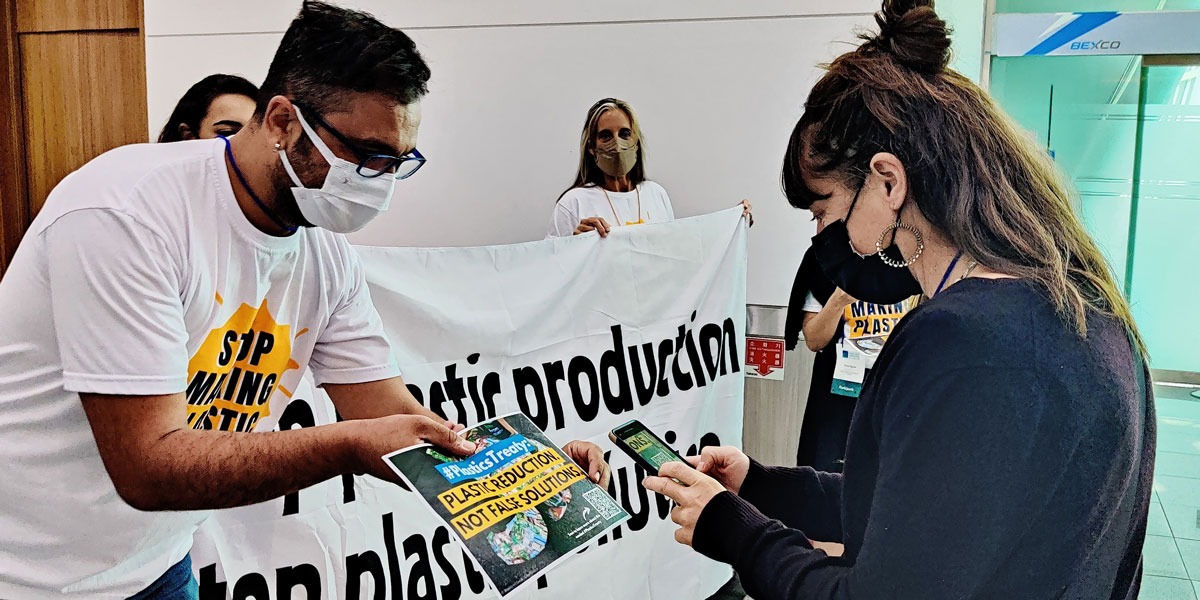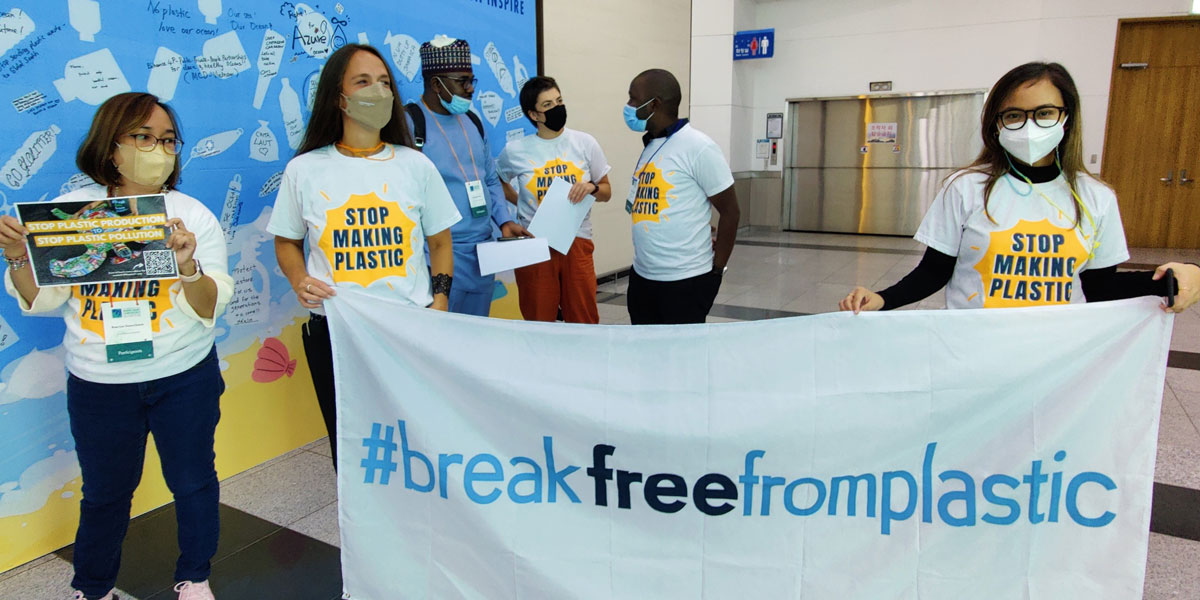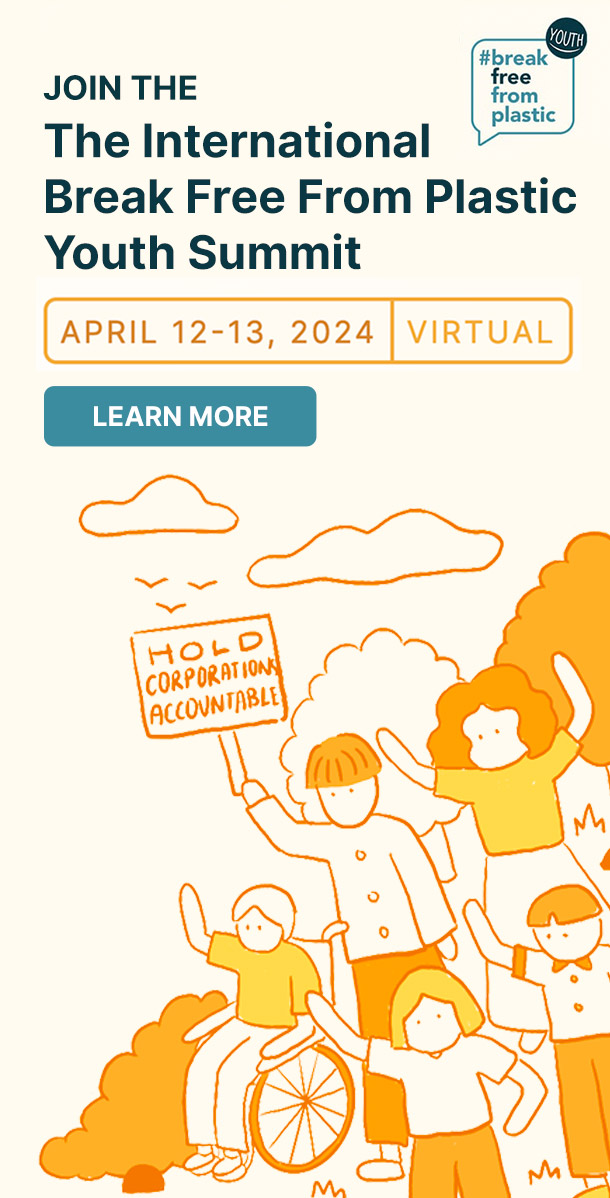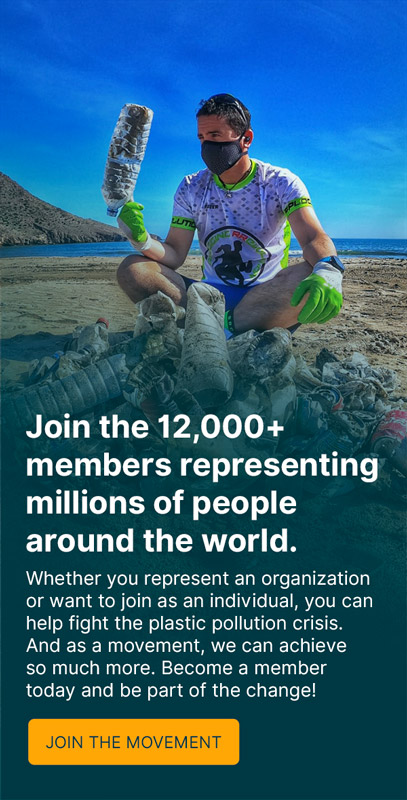Busan, South Korea— As governments, industry, academe, civil society and other stakeholders gather for the 7th International Marine Debris Conference (7IMDC, September 18-23, 2022), the global #breakfreefromplastic movement highlights the need to significantly reduce plastic production in order to stop plastic pollution of every kind. Over 99% of plastics are made of fossil fuels, a large contributor to climate change. The climate crisis will only bring about more unprecedented severe weather conditions as in the case of strong typhoons that recently hit South Korea. Plastics emit greenhouse gasses throughout its life cycle—from extraction, to manufacturing, transport, use, landfilling, recycling, and incineration. Any presented solution to plastic pollution that does not address the source of the crisis stalls us from moving closer to a world free of plastic pollution.

In a demonstration following a plenary session, #breakfreefromplastic members held banners and placards calling for plastic reduction and genuine solutions in addressing plastic pollution.
“To stop plastic pollution, the global plastics treaty must address how to stop plastic production including its harmful toxic additives," said Griffins Ochieng of the Centre for Environmental Justice And Development (CEJAD) Kenya. "This addresses the problem at the root cause, not the symptoms."
“Fast moving consumer goods companies, such as Unilever, Nestle, Coca Cola and Pepsi, are prioritizing investments in false solutions that allow them to rely on single use plastics,” said Satyarupa Shekhar, Asia Pacific Regional Coordinator of Break Free From Plastic. “They engage third-party services to collect and dispose of plastic waste in cement kilns and incinerators, all the while making public statements that frame plastic pollution as a marine debris problem. These businesses must switch to delivering their products without using single-use plastics (SUPs) and hiding behind false solutions and false narratives.”
Members also invited 7IMDC participants to sign the #StopShippingPlasticWaste petition. Plastic waste from the US, UK, EU, Japan, and Australia, under the guise of ‘recycling’, is often exported to countries across Asia Pacific, Africa, and Latin America. Destination countries lack the infrastructure to deal with this waste, which adversely affects the health of their citizens, and their environment. Waste trade allows plastic production to continue with impunity, and is linked to marine plastic pollution. The petition calls on the world’s top shipping companies to follow the example of CMA-CGM, and stop shipping plastic waste.
Recently, the United States-based organization Ocean Conservancy’s (OC) has publicly apologized for the harm caused by the publication of their 2015 report “Stemming the Tide: Land-based strategies for a plastic-free ocean,” which blamed Asian countries (China, Indonesia, Philippines, Thailand, and Vietnam) for marine plastic pollution. Environment groups together with OC have started a repair and transformative justice process to mitigate the harm caused by the report and debunk false solutions including “waste-to-energy” incinerators and international waste trade that continue to pollute many communities in Asia.
"When countries are allowed to ship off plastic waste, there is no incentive to reduce plastic consumption and waste," said Mageswari Sangaralimgam, Research Officer and Honorary Secretary of Sahabat Alam Malaysia. "Even worse, export destinations, often less wealthy economies with weaker environmental regulations, become saddled with problems of imported plastic waste pollution and trafficking crimes. If we continue these practices, there will be no end to the leakage of plastics into the ocean. Countries should stop exporting plastic waste. When we are forced to deal with our own waste, this will catalyze innovative and real solutions to end plastic pollution."
Meanwhile, an International Negotiating Committee (INC) is set to work on drafting a legally binding global plastics treaty to end plastic pollution, as mandated by the resolution adopted in the last United Nations Environment Assembly (UNEA 5.2). As countries begin the negotiations towards a comprehensive plastics treaty that shall cover measures along the entire life cycle of plastics, #breakfreefromplastic calls for significant plastic reduction measures and leave no room for any false solutions to continue.
Miko Aliño, Break Free From Plastic Project Coordinator for Sachets, said, “With governments calling for a legally-binding plastics treaty and more organizations like Ocean Conservancy shifting away from false solutions, it is a high time for businesses—from petrochemical companies to fast-moving consumer goods corporations—to join this revolution by reducing their plastic footprint. And reduction means putting a cap on plastic production and not misleading everyone with plastic offsets and silver-bullet fixes.”
About Break Free From Plastic— #breakfreefromplastic is a global movement envisioning a future free from plastic pollution. Since its launch in 2016, more than 2,000 organizations and 11,000 individual supporters from across the world have joined the movement to demand massive reductions in single-use plastics and push for lasting solutions to the plastic pollution crisis. BFFP member organizations and individuals share the shared values of environmental protection and social justice and work together through a holistic approach to bring about systemic change. This means tackling plastic pollution across the whole plastics value chain—from extraction to disposal—focusing on prevention rather than cure and providing effective solutions.www.breakfreefromplastic.org




